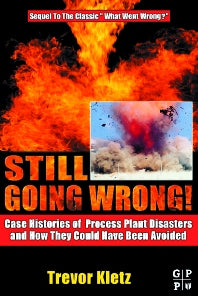Freshly Printed - allow 10 days lead
Couldn't load pickup availability
Still Going Wrong!
Case Histories of Process Plant Disasters and How They Could Have Been Avoided
Trevor Kletz's follow-up to his classic bestseller, "What Went Wrong?"
Trevor Kletz (Author)
9780750677097, Elsevier Science
Hardback, published 14 November 2003
256 pages
22.9 x 15.1 x 2.1 cm, 0.544 kg
"Trevor Kletz has helped to educate many people in industry to the hazards that they are confronted with on a regular basis, especially those in the chemical, oil and process industries. Still Going Wrong is his eleventh book, and most people can learn something from it, whether they are involved in production, maintenance or design.He has some very good advice for incident investigators, looking for the true cause of an accident and not just who to blame.Still Going Wrong? is very aptly titled. All process industries have a tremendous amount to learn. The pressure for improving safety standards is relentless, as it should be. This book will help build awareness of the diverse causes of accidents. It will not prevent them unless the reader is committed to thinking about the lessons and applying them appropriately in their own area of responsibility. If lessons in this book prevent one incident in each reader's plant, the cost of the human suffering incurred in the book will not have been wasted.Without a doubt I recommend this book for anyone involved with management, design, operation, health and safety, or maintenance, in the process industries." --Nick Spencer GM and Director, ConocoPhillips Ltd Humber Refinery"Safety management may not be rocket science but it does require detailed attention and constant review and enhancement....Trevor has subtitled this book "Case studies of Process Disasters and how they could have been avoided". Maybe it could have been...Here's to the Next One.We should also recognize that we have all been involved in 'near misses' which could have escalated and been one of the examples in Trevor's book. It is essential that we do learn from these incidents and others like them. "Still Going Wrong" is another wake up call, easy to read and to follow and at times you will be left with the feeling "Why!?" --Frank Crawlev, From Industrial Safety Management, Vol 6, No 2, April 2004, p 29."Still Going Wrong is an immensely readable book and one that I would recommend to all personnel with an interest in safety." --Health and Safety At Work August 2004"This book is an excellent compilation of case histories of process plant accidents and discussions of how they could have been avoided. I feel that this book will be of great use to people who work in the chemical process industries and are involved in process design, production, and maintenance. As with the author's other books, this one is very easy to read. It imparts much useful and practical information, which could lead to avoidance or minimization of costly accidents, both with respect to property and human life loss. It will make a very useful addition to the technical library of process safety/loss prevention engineers." --Journal of Loss Prevention in the Process Industries, July 2004“One can classify technical books into two categories: There are reference books that you turn to only when the need arises; then, there are books you read simply because they are interesting, readable and relevant. Trevor Kletz’s latest book, “Still Going Wrong? happily falls into this latter category…Mr. Kletz provides the insight that can help you delve into these issues, and provides materials that help you learn from others’ mistakes…In his acknowledgements, Mr. Kletz notes that he is 82, and that this is likely to be his last book. Fortunately for us, he has captured his knowledge and experience in a format that will certainly be of benefit to the next generation of process-industry workers.? --Chemical Engineering, Nov. 2005
This is Trevor Kletz's follow up to his extremely successful What Went Wrong? Case Histories of Process Plant Disasters. In it, Kletz reinforces the messages in his now-classic book of famous case histories, but the majority of the book covers points not covered in the original. This new volume will focus more on procedural changes that can be made, not only at the technical or engineering levels, but at the managerial level, to prevent disasters from happening.
Maintenance
Entry into confined spaces
Changes to processes and plants
Changes in organization
Changing procedures instead of designs
Materials of construction (including insulation) and corrosion
Operating methods
Explosions
Poor communication
I didn't know that...
Control
Leaks
Reactions - planned and unplanned
Both design and operations could have been better
Accidents in other industries
Accident investigation - Missed opportunities
Afterthoughts.
Subject Areas: Technical design [TBD], Health & safety issues [KNXC]


